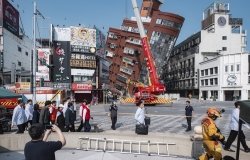"Bad Elements: Chinese Rebels from Los Angeles to Beijing"
Overview
By Robert Hathaway
What does it mean to be Chinese? What is the place of dissent in Chinese society? Why do some Chinese become dissidents, while many more do not? Why are many Chinese dissidents converted Christians? Does Chinese culture, or Confusion tradition, promote authoritarianism? Are authoritarian regimes most likely to guarantee stability in China?
These are some of the questions former Wilson Center Fellow (1998-99) Ian Buruma explored in a Nov. 28 public lecture organized by the Asia Program in order to celebrate the publication of his new book, which was written in part during his fellowship year at the Wilson Center. Bad Elements: Chinese Rebels from Los Angeles to Beijing (Random House, 2001) focuses on Chinese dissidents throughout the Chinese-speaking world to examine universal themes of national identity and political struggle. By building his story around specific individuals, he hopes to render these broad political, even philosophical, questions less abstract.
Buruma's conclusions are stark: Only democracy can bring stability to China. Political stability in China today is far less assured than many think. The only two remaining rationales for one-party rule in Beijing are economic prosperity and "a rather nasty nationalism." But economic well-being inevitably gives way to hard times, and Chinese nationalism can be easily turned against the communist rulers in Beijing. Unless China solves its problem of political legitimacy, it is fated to experience another period of violent upheaval in the next 10 - 15 years. And China will never have political legitimacy until the Chinese government rests upon the consent of the governed.
An independent journalist, Buruma has provided a firsthand account of some of the courageous men and women who dare defy the Chinese government. It is a safe bet that unless we come to know the people about whom Buruma writes, we stand little chance of understanding either contemporary China, or what China is to become in the years ahead.
Hosted By

Indo-Pacific Program
The Indo-Pacific Program promotes policy debate and intellectual discussions on US interests in the Asia-Pacific as well as political, economic, security, and social issues relating to the world’s most populous and economically dynamic region. Read more
Thank you for your interest in this event. Please send any feedback or questions to our Events staff.










